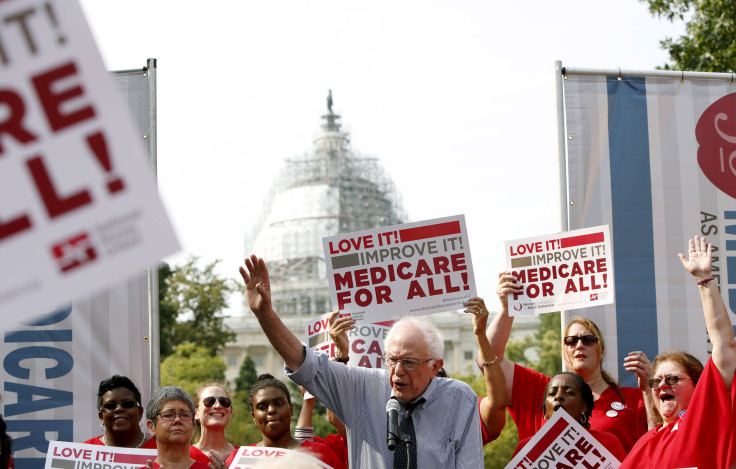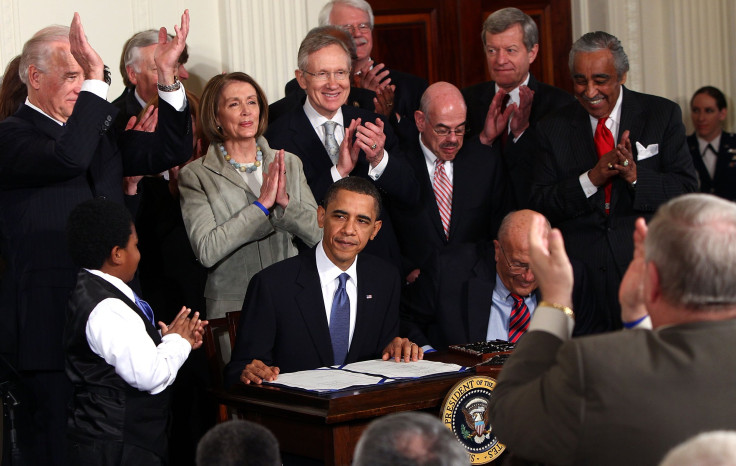Democrats Fought For 25 Years Over Single-Payer. Now Many Back Medicare-For-All

When U.S. Sen. Bernie Sanders’ introduces his Medicare-for-All legislation on Wednesday, advocates of a single-payer, government-sponsored health care hope it will be the end of a bitterly fought policy battle that has roiled the Democratic Party for generations.
Since Democratic President Harry Truman first proposed a government-sponsored universal health care system in 1945 — and since a Democratic president and Democratic congress first enacted Medicare and Medicaid in the mid-1960s — progressives have hoped that the United States would follow other industrialized countries by guaranteeing health care to all citizens. Indeed, many of the original proponents of Medicare hoped the system would ultimately be expanded to cover the entire country — as former Social Security commissioner Robert Ball wrote, “We expected Medicare to be a first step toward universal national health insurance.”
And although the intervening years saw the rise of Republican President Ronald Reagan, who derided “socialized medicine,” some Democrats continued to champion the idea. The party’s 1992 presidential contender Jerry Brown ran for the White House promising to support single-payer. But when Bill Clinton defeated him and won the presidency, the Clinton administration opted to back health care reforms that preserved the existing private insurance system — even as Hillary Clinton made favorable comments about single-payer. A generation later, Barack Obama also retreated from single-payer, and instead pushed the Affordable Care Act, which subsidizes the private insurance system.
Now, things appear once again to be shifting. Even as Sanders has declared that his Medicare-for-All bill is not a litmus test, Democrats from across the party’s ideological spectrum are flocking to his legislation. On the progressive side, Democratic senators such as Elizabeth Warren (MA), Jeff Merkley (OR) and Al Franken (MN) have signed onto the legislation. Within the party establishment, former Vice President Al Gore has expressed support, as has conservative former Sen. Max Baucus — one of the architects of the Affordable Care Act whom single-payer advocates saw as a nemesis.
With polls showing rising support for government-sponsored health care, the party’s long civil war over the issue may be over, potentially allowing a more unified party to campaign on Medicare-for-All in 2018.
Here’s how the Democrats’ struggle played out.
1992: Jerry Brown Promises Single-Payer
During his campaign for president, California Gov. Jerry Brown was unequivocal in his support for a government-sponsored, single-payer health care system. During a Democratic primary debate with Bill Clinton, Brown declared : “My preference is that we create a single system, put everyone under a universal health care system. We treat health care not as a commodity to be played with for profit but rather the right of every American citizen when they’re born.”
“And since you have only one source of income in the whole medical establishment, you can drive down the cost,” he said. “With the holding down of the cost, you can eliminate the intermediary, the middle man, the bureaucracy.”
1993: Hillary Clinton Praises Single-Payer, Then Shuns It
When Bill Clinton assumed the presidency in 1993, he tasked then-First Lady Hillary Clinton to come up with a health care reform proposal. That year, she acknowledged a “convincing case” for single-payer. The following year, Hillary Clinton said that if Congress didn’t pass health care reform, “I believe that by the year 2000 we will have a single-payer system. I don’t think it’s — I don’t even think it’s a close call politically.”
The 1993 health care plan focused on the idea of “managed competition,” which relied on markets, not the government, to bring down the cost of health care, and included a mandate that employers provide insurance to their employees.
2003: Obama Unequivocally Backs Single-Payer
As a third-term state senator in Illinois, Barack Obama voiced his support for single-payer during a 2003 speech.
"I happen to be a proponent of a single-payer universal health care plan,” he said. “I see no reason why the United States of America, the wealthiest country in the history of the world, spending 14 percent of its Gross National Product on health care, cannot provide basic health insurance to everybody... A single-payer health care plan, a universal health care plan — that's what I'd like to see. But as all of you know, we may not get there immediately. Because first we’ve got to take back the White House, and we’ve got to take back the Senate, and we have to take back the House."
The next year, Obama became the principal sponsor of the Health Care Justice Act of 2004 in Illinois, which created a commission to recommend ways to provide “uniform benefits for all Illinois residents.” Republicans at the time “saw it as a back-door attempt to bring universal, single-payer coverage to Illinois.”
2006: California Democrats Pass Single-Payer Bill. It's Vetoed
The Democratic-controlled California legislature passed a bill to create a government-sponsored single-payer system. The legislation, sponsored by Sen. Sheila Kuehl, was vetoed by then-Gov. Arnold Schwarzenegger (R), who said, “Socialized medicine is not the solution to our state’s health care problems.”
2006: Obama Says He Supports Single-Payer In Concept, But Not Necessarily In Practice
In an interview with David Sirota for a profile in The Nation magazine, then-Sen. Obama appeared to back off his previous support for single-payer.
“I would not shy away from a debate about single-payer health care,” he said. “Right now I am not convinced that single-payer health care is the best way to achieve universal health care.”
He added: “It might be the best way if you started completely from scratch — if you had no legacies. Let’s just take a real simple example. Everybody who supports single-payer health care says, look at all this money we would be saving from insurance and paperwork. That represents 1 million, 2 million, 3 million jobs of people who are working at Blue Cross Blue Shield or Kaiser... What are we doing with them? Where are we employing them?”
2008: Obama Denies Ever Supporting Single-Payer; Clinton Slams Him
Despite his previous support, Obama at a 2008 presidential debate declared, “I never said that we should try to go ahead and get single-payer.” Clinton replied, “When Senator Obama ran for the Senate, he was for single-payer and said he was for single-payer if we could get a Democratic president and Democratic Congress... As time went on, the last four or so years, he said he was for single-payer in principle, then he was for universal health care. And then his policy is not, it is not universal.”
2008: Schwarzenegger Vetoes Democrats’ Single-Payer Bill Again
Kuehl’s bill once again passed, and the Republican governor once again rejected it.

2009: Obama’s Affordable Care Act Prevents Single-Payer
Though Obama in 2003 had said a Democratic House, Senate and White House could bring about single-payer, his administration quashed the idea once he and the new Democratic Congress were sworn in. During a June interview with National Public Radio, Secretary of Health and Human Services Kathleen Sebelius declared that single-payer would not be on the table.
“This is not a trick, this is not single-payer,” Sebelius said. “ As you know, there've been a lot of congressional advocates who say why not. Why can't we have a single-payer? That's not what anyone is talking about — mostly because the president feels strongly, as I do, that dismantling private health coverage for the 180 million Americans that have it, discouraging more employers from coming into the marketplace, is really the bad direction to go.”
When NPR host Steve Inskeep asked Sebelius if the Affordable Care Act was being deliberately sculpted to prevent single-payer, Sebelius said: “I think that's very much the case. And again, if you want anybody to convince people of that, talk to the single-payer proponents, who are furious that the single-payer idea is not part of the discussion.”
2011: Vermont Enacts Single-Payer Legislation
Before the Affordable Care Act had been fully implemented, Vermont — which Sen. Sanders (I) represents in Washington — passed the first single-payer plan in the country. Reuters reported at the time that the 2011 legislation, signed by then-Democratic Gov. Peter Shumlin, would involve a new exchange “managed by a five-member board [that] will set reimbursement rates for health care providers and streamline administration into a single, unified system... The goal is an eventual state-funded and operated single-payer system.”
2014: Vermont’s Democratic Governor Kills Single-Payer
By late 2014, Democratic Gov. Pete Shumlin abandoned the Vermont plan, calling it “the biggest disappointment of his career.” The tax increases were too much for the state to bear, he said.
2016: Sanders Touts Medicare-for-All, Clinton Slams Him
Sanders campaigned in 2016 on a promise to expand Medicare to cover all Americans. His plan was slammed for its allegedly exorbitant price tag — though defenders said the initiative would benefit the economy. Clinton, meanwhile, criticized Sanders for pushing the proposal, dismissing it as unrealistic.
"People who have health emergencies can't wait for us to have a theoretical debate about some better idea that will never, ever come to pass,” she said.
2017: California Passes Single Payer Again, Brown Blocks It
Brown, serving his fourth term as governor of California, differs from the Brown of 1992. The California state Senate passed a single-payer bill, but Brown and California House Speaker Anthony Rendon opposed and helped shelve it. Brown questioned where the money would come from, saying that the single-payer concept “is called ‘the unknown by means of the more unknown’... In other words, you take a problem and say, ‘I am going to solve it by something that’s...a bigger problem,’ which makes no sense.”
2017: With Increasing Support, Medicare-for-all Arrives At The Senate
As some Democrats continue to oppose single-payer, popular support for the idea is rising: 53 percent of Americans support “a national health plan in which all Americans would get their insurance from a single government plan,” according to a June Kaiser Health survey.
The idea have become more popular with liberal U.S. House members as well. Rep. John Conyers has a Medicare-for-all bill in the House with a remarkable 117 co-sponsors — roughly 60 percent of the Democratic caucus and the first time a House majority of Democrats has supported a Medicare-for-All bill — but House Minority Leader Nancy Pelosi is not among them.
Pelosi said Tuesday that she would not endorse Sanders’ Medicare-for-All bill and that she is focusing on protecting the Affordable Care Act. Tom Perez, chairman of the Democratic National Committee, has also said that in the current political climate, “preserving the Affordable Care Act is a major victory.” Clinton’s 2016 running mate, Virginia Sen. Tim Kaine, told Jeff Stein of Vox that he won’t support Medicare-for-All and prefers “more choice in the marketplace.”
Still, late Tuesday, on the eve of the Senate bill’s introduction, lawmakers were racing to announce on Twitter and Facebook that they would co-sponsor Sanders’ legislation. Supporting the bill may become a litmus test for future Democratic presidential candidates.
Current Democratic senators who have signed on as co-sponsors of the Sanders bill as of 8:00 pm on Tuesday:
- Tammy Baldwin (WI)
- Richard Blumenthal (CT)
- Cory Booker (NJ)
- Al Franken (WI)
- Kamala Harris (CA)
- Mazie Hirono (HI)
- Martin Heinrich (NM)
- Kirsten Gillibrand (NY)
- Ed Markey (MA)
- Jeff Merkley (OR)
- Brian Schatz (HI)
- Tom Udall (NM)
- Elizabeth Warren (MA)
- Sheldon Whitehouse (RI)
© Copyright IBTimes 2024. All rights reserved.






















